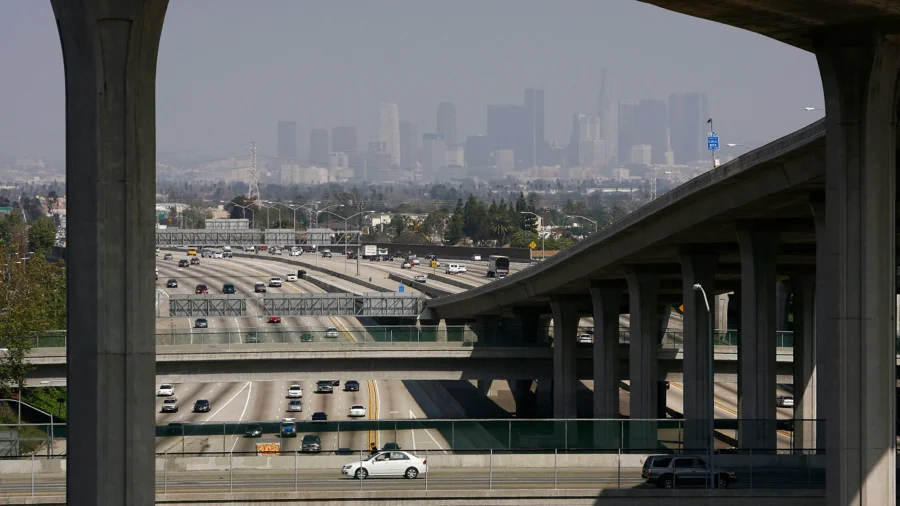A federal judge in Kentucky has struck down a Biden administration rule that required states to measure and report the greenouse gas emissions from any vehicles traveling on the national highway system.
“With this victory in court, we’re slamming the brakes on the Biden Administration’s politics that make no sense,” said Kentucky Attorney General Russell Coleman, who led a coalition of 21 state attorneys general in suing the Federal Highway Administration (FHWA) over the rule that sought to force states to cut carbon dioxide emissions on their roads.
Multiple states that sued over the rule argued that it could dampen job creation and eliminate future economic development.
Judge Benjamin Beaton of the U.S. District Court for the Western District of Kentucky blocked the FHWA rule in a 26-page order and opinion issued on April 1, calling it “invalid” and “a statutorily unsupported and substantively capricious exercise of the [FHWA] Administrator’s rulemaking authority.”
Judge Beaton only blocked the rule in the 21 plaintiff states, not nationwide. He also asked the parties to file supplemental briefs “on the proper remedy” within three weeks in light of potentially conflicting requirements from other courts.
In a separate lawsuit challenging the same emissions rule, a Texas judge ruled at the end of March to block its enforcement in the Lone Star state.
‘Lost Touch With Reality’
The rule was issued by FHWA in November 2023 as part of President Joe Biden’s efforts to slash carbon emissions in half by 2030.
The regulation forces state transportation departments and metropolitan planning organizations (MPOs) to measure their transportation-related emissions on the U.S. highway system and set their own emission reduction targets.
It also required state Departments of Transportation and MPOs to report every two years on their progress in meeting the declining targets, while authorizing FHWA to assess the state’s progress toward achieving those targets.
“This new performance measure will provide states with a clear and consistent framework to track carbon pollution and the flexibility to set their own climate targets,” Transportation Secretary Pete Buttigieg said in a statement on Nov. 22, 2023.
FHWA did not immediately respond to a request for comment on the Kentucky ruling.
The Kentucky attorney general said that the rule was part of President Joe Biden’s “radical environmental agenda” that “has lost touch with reality” and that Kentucky families were paying the price.
Mr. Coleman was joined in the lawsuit by attorneys general from Alabama, Alaska, Arkansas, Florida, Idaho, Indiana, Iowa, Kansas, Mississippi, Montana, Nebraska, North Dakota, Ohio, Oklahoma, South Carolina, South Dakota, Utah, Virginia, West Virginia, and Wyoming.
“The Court declares that the Final Rule exceeds the Federal Highway Administration’s statutory authority and is arbitrary and capricious,” Judge Beaton wrote in the April 1 order.
Texas Ruling
In finalizing the rule in November 2023, FHWA said that the emissions rule was part of President Biden’s “whole-of-government approach” to slashing carbon emissions by half by 2030 and calling the measure an important step toward “addressing the impacts of climate change.”
FHWA Administrator Shailen Bhatt said that transportation was the leading source of greenhouse gas emissions and claimed that cutting emissions from the transport sector “is critical to addressing the climate crisis.”
Texas sued FHWA in December 2023, arguing that the agency lacked legal authority from Congress to enact the rule and that it violates the Administrative Procedure Act.
In his ruling, Judge James Hendrix of the U.S. District Court for the Northern District of Texas agreed, stating that the Biden administration lacked authority under law to impose the greenhouse gas emissions performance measure.
“When a regulation attempts to override statutory text, the regulation loses every time, regulations can’t punch holes in the rules Congress has laid down,” wrote the judge, who was appointed by former President Donald Trump.
A FHWA spokesperson told The Epoch Times in an emailed statement following the Texas ruling that it would review the decision to decide on next steps.
“The Department of Transportation (DOT) and Federal Highway Administration (FHWA) remain committed to supporting the Biden-Harris Administration’s climate goals of cutting carbon pollution in half by 2030 and achieving net-zero emissions by 2050,” the spokesperson said at the time.
“We are reviewing the Texas court’s decision and determining next steps.”
Republicans, including Transportation and Infrastructure Committee Chairman Rep. Sam Graves (R-Mo.) and Highways and Transit Subcommittee Chairman Rick Crawford (R-Ark.), praised the ruling in a joint statement on March 28.
“This was a clear case of blatant overreach by the Biden Administration from the beginning, and we commend the Court for its ruling that a ‘federal administrative agency cannot act without congressional authorization,'” the lawmakers said.
“Congress rejected the inclusion of a GHG performance measure requirement when the infrastructure law was developed, making the Administration’s rulemaking an unlawful attempt to circumvent Congress and force this one-size-fits-all burden upon every state and community across the country.
“We appreciate the ruling and remain committed to ensuring the Administration does not exceed its authority.”
Katabella Roberts contributed to this report.
From The Epoch Times


